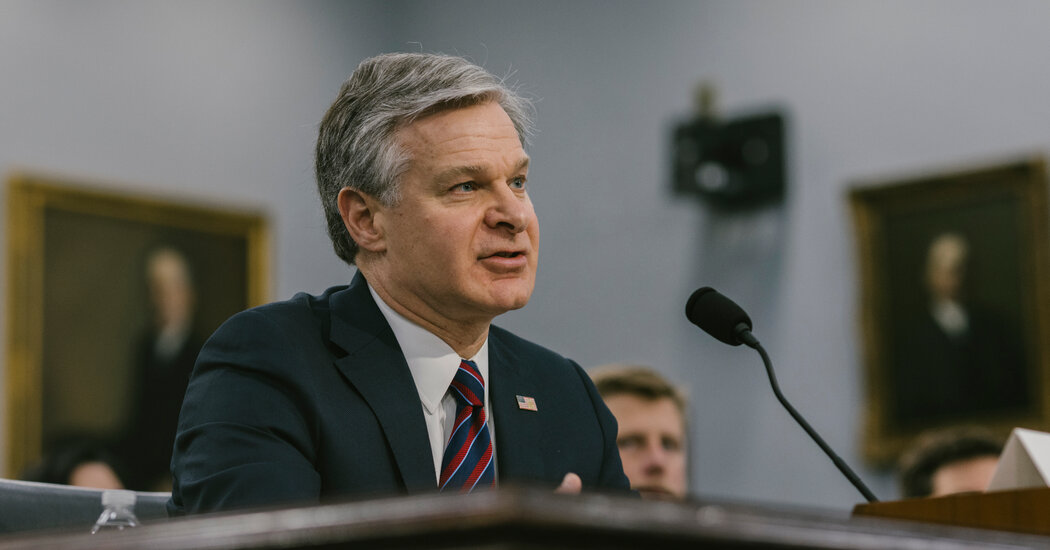Christopher A. Wray, the director of the Federal Bureau of Investigation, paid a rare visit to sub-Saharan Africa this week to discuss counterterrorism strategies with regional partners at a time when both the Islamic State and Al Qaeda are gaining momentum on the continent.
Mr. Wray, who met with officials in Kenya and Nigeria, repeated his warning that the United States and its allies worldwide are “operating in a heightened threat environment” that has been energized by the war between Israel and Hamas in Gaza.
“The main reason for my visit to both countries was to raise awareness about threats on the continent that have serious implications for the U.S. homeland but that don’t get the attention they deserve,” Mr. Wray said in a telephone interview from Nigeria on Friday. “For several years now, groups like ISIS, like Al Qaeda, have considered Africa very fertile ground.”
Indeed, U.S. intelligence officials estimate that Al Shabab in Somalia has roughly 7,000 to 12,000 members and annual income — including from taxing or extorting civilians — of about $120 million, making it the largest and wealthiest Qaeda affiliate in the world.
“Shabab is in many ways one of the most menacing foreign terrorist organizations out there,” Mr. Wray said.
At the same time, groups in West Africa that have declared allegiance to Al Qaeda and the Islamic State are on the march. Military coups have toppled civilian-led governments in Mali, Guinea, Burkina Faso and Niger. The new leaders have ordered U.S. and French troops to leave, and in some cases invited Russian mercenaries to take their place.
As a result, American officials are scrambling to work with a new set of countries in coastal West Africa to battle a violent extremist insurgency that they say is steadily spreading south.
The discussions in Kenya and Nigeria between U.S. and African officials this week, Mr. Wray said, centered on overlapping interests and ways to fight the common threats.
“Countering threats posed by groups like Shabab and ISIS is certainly more than any one agency or even any one government can tackle alone,” he said.
Mr. Wray’s visit to Kenya — the first by an F.B.I. director in 15 years, officials said — comes after President Biden last month hosted the Kenyan president, William Ruto, for a state dinner and pledged to designate the country as a “major non-NATO ally.” The move reflects the White House’s determination to deepen relations with the East African nation even as other countries — including Russia and China — are racing to do the same.
The F.B.I. has worked closely with the Kenyans since the Sept. 11, 2001, terror attacks to track down Qaeda operatives. In 2020, the F.B.I. and the State Department helped Kenya establish a terrorism task force modeled on the ones that the bureau relies on in cities across the United States. It was the bureau’s first joint terrorism task force outside the United States, according to the F.B.I.
The F.B.I. also has agents posted at the U.S. Embassy in Nairobi who investigate terrorism cases and other crimes.
In the Sahel region of West Africa, U.S. officials say they are changing their approach to combat an insurgency that is rooted in local concerns. Competition for land, exclusion from politics and other local issues have swelled the ranks of the militants more than any particular commitment to extremist ideology.
“When you look at the region, the Western Africa region more broadly, we remain concerned about instability and how that could have an impact on terrorist groups’ ability to exploit that situation,” said Mr. Wray, the first F.B.I. director to visit Nigeria.
“That’s part of why we are very focused on working so closely with our partners in Nigeria and some of the other countries to try to stay as vigilant as we can be,” he said.
The ISIS and Al Qaeda affiliates in Africa have concentrated their attacks in the region, rather than in Europe or the United States. Mr. Wray noted, however, the case of a Shabab operative who was charged a few years ago with plotting to hijack an airplane and crash it into a building in the United States in a Sept. 11-style attack.
“Beyond the threat to Westerners and our interests here in Africa, we’re very vigilant to the possibility that their plans and intentions could shift at any point,” Mr. Wray said. “So while yes, these are ‘foreign’ threats, people in the U.S. shouldn’t think of them as issues that are a world away.”
Adam Goldman contributed reporting.

